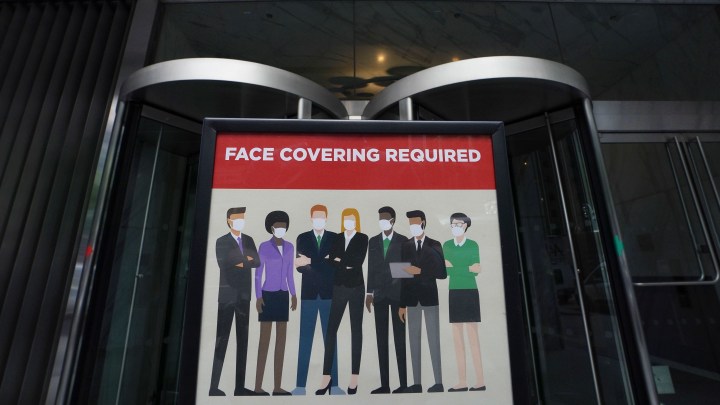
N.Y. businesses await details of “HERO Act”

New York State’s “Health and Essential Rights Act,” known as the “N.Y. HERO Act,” was signed by Gov. Andrew Cuomo in May. When it takes full effect, it will require companies with more than 10 employees to implement a series of safety protocols to help prevent transmission of airborne diseases.
The law does a few things. It requires the New York State Department of Labor to come up with workplace standards to prevent airborne infectious diseases. Those rules aren’t out yet. But they will address things like social distancing, mask-wearing and ventilation.
David Michaels at the George Washington University School of Public Health said that to protect people from COVID, you need to use what’s called the “Swiss cheese” model: “Where you have different protections and the combination of them is the most effective. Masking makes a big difference, but sometimes the virus gets beyond the mask.”
Same goes for distancing and ventilation — none of them is 100% effective.
The law also says that workers have the right to refuse to work in unsafe conditions and that it’s illegal to retaliate against them for raising safety concerns. It requires companies to allow workers to form safety committees.
“They’re going to have to make sure that these workplace safety committees are, you know, just procedurally able to meet without reduction of pay, attend training without reduction of pay,” said Colby Berman, a labor and employment lawyer.
And the committees have to be made up of at least two-thirds non-management employees. “So, unlike any other business feature, where it’s management runs all, this is now suddenly very democratized,” Berman said.
One concern about the law is that it’s not specific enough. Ken Pokalsky at the Business Council of New York State said, for example, it’s not clear how those safety committees would be formed. Would you need a majority vote?
“Say I’m in a setting with, you know, between 50 and 100 employees, and three of them want to create a committee and 97 don’t. What happens?” Pokalsky asked.
It’s also unclear how the law will apply to other airborne infectious diseases like the flu, and, in the case of COVID, whether the rules will stay in place as vaccination rates increase and case numbers drop further.
Once the rules are published, businesses that don’t follow them can face fines, starting at $50 a day.
There’s a lot happening in the world. Through it all, Marketplace is here for you.
You rely on Marketplace to break down the world’s events and tell you how it affects you in a fact-based, approachable way. We rely on your financial support to keep making that possible.
Your donation today powers the independent journalism that you rely on. For just $5/month, you can help sustain Marketplace so we can keep reporting on the things that matter to you.


















